 orocco and England today are linked most conspicuously by tourism, but in the 16th
and 17th centuries the two countries were more closely connected, both politically
and economically. From this period, the surviving correspondence with North Africa
—predominantly Morocco—in the uk State
Papers amounts to more than 20,000 folios in various languages, and there were nearly
a hundred embassies exchanged among European and North African rulers.
orocco and England today are linked most conspicuously by tourism, but in the 16th
and 17th centuries the two countries were more closely connected, both politically
and economically. From this period, the surviving correspondence with North Africa
—predominantly Morocco—in the uk State
Papers amounts to more than 20,000 folios in various languages, and there were nearly
a hundred embassies exchanged among European and North African rulers.
| |
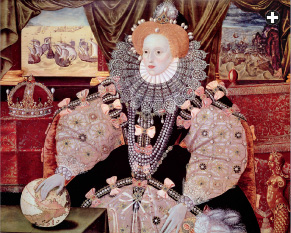
|
|
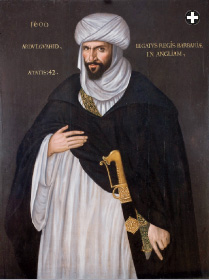
|
|
| |
scala / white images / art resource |
|
university of birmingham |
|
| |
In 1588, George Gower painted the "Armada Portrait" of Queen Elizabeth i,
portraying her with her right hand resting on a globe set conspicuously beneath
her crown. This was a symbolic assertion of her power following the English defeat
of the Spanish Armada, which Gower depicted in the painting's two background windows.
Seven years earlier, Elizabeth had authorized a large shipment of timber to aid
Morocco in building ships to attack Spain. |
|
During
'Abd al-Wahid ibn Masoud's term in London, he negotiated commercial and military
trade agreements as well as continued alliance against Spain. Some suggest that
the portrait may have inspired Shakespeare's protagonist in "Othello," published
a few years after 'Abd al-Wahid's embassy. |
|
The Anglo-Moroccan connection originates in the quarrels between the two half-sisters
Queen Elizabeth i and Queen Mary i.
Elizabeth suspected that Mary's husband, Philip ii of
Spain, had designs on England, and she was consequently interested in an ally who could
join in attacking Spain. On the Moroccan side, there was considerable enthusiasm for
expelling the Spanish and Portuguese from the several Moroccan coastal cities they had
conquered. The Moroccans also wanted naval support in case of further encroachment by
the Ottoman Turks, who were eager to extend their empire west from Algiers into Morocco.
It was for this last reason that the Moroccan sultan Ahmad al-Mansur was unwilling to
collaborate with the Ottomans despite Ottoman consideration of an invasion of Spain:
He preferred instead an alliance with the English.
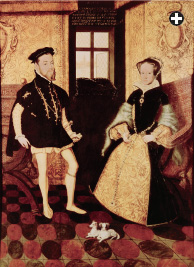 |
|
scala / white images / art resource |
|
King Philip ii of Spain with his wife, Queen Mary
i of England, in 1558. The Anglo-Moroccan connection
had its origins in the quarrels between Queen Elizabeth i
and Queen Mary, who was Elizabeth's predecessor on the throne. Elizabeth feared that,
after Mary's death, Philip would advance a claim to succeed her.
|
There were also excellent opportunities for trade (See "Moroccan Imports into England," below).
As well as commercial exchanges, such as Moroccan sugar and dates for English cloth—
or for a bass lute for the sultan—both nations were also interested in war materiel.
England wanted Morocco's excellent saltpeter with which to manufacture gunpowder, while
Morocco sought cannonballs and guns, as well as shipwrights and timber for shipbuilding.
These were sensitive matters: European powers at times accused England of trading arms
to an enemy, and the same reproach was raised by Muslim powers against Morocco.
The third issue was piracy. Here, both Moroccan and English sovereigns' attitudes
varied with the political situation. Elizabeth, for example, tacitly encouraged
Francis Drake's piracy against the Spanish, while at the same time wanting Morocco
to rein in the notorious Rovers of Salé and permit ransom for English subjects taken
as slaves. The sultan, on the other hand, though anxious to bring Salé under his
control, was, like Elizabeth, not loath to profit from the pirates' activities. In
short, there was much to negotiate.
The first recorded English merchant vessel to reach Morocco docked in 1551. In the following
year, three ships set sail from Bristol and arrived at Safi and Agadir to unload, among other
things, cloth, coral, amber and jet (gem-quality lignite). Twenty years later, in 1576, English
merchant-envoys were at the court of Sultan Moulay 'Abd al-Malik, where they negotiated the
exchange of saltpeter for a large quantity of cannonballs. On July 10 of that year, 'Abd
al-Malik wrote to Elizabeth, saying that he was sending her an ambassador. She replied that,
in view of the subjects of their negotiations, the ambassador's visit should be kept a secret.
If the visit indeed occurred, then her suggestion was well heeded, for there are no other
records of it.
|
|
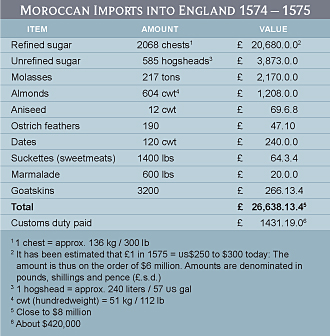 |
'Abd al-Malik's successor, Ahmad al-Mansur, was equally interested in trade with England.
In 1581, after Philip ii was crowned king of Portugal,
Elizabeth gave permission for 600 tons of first-class wood, probably oak, to be felled in
Sussex and Hampshire for export to Morocco so that al-Mansur's fleet might attack Spain.
In 1588, after the English defeat of the Spanish Armada, al-Mansur sent an envoy, Marzuq
Ra'is, to the court of Elizabeth to discuss a joint attack against Spain. Al-Mansur's letter
fairly pleads for secrecy:
When he alights in your company and makes his camel kneel, if God wills, in your valley,
you will direct your solicitude towards him so as to receive what he has by word of mouth
and so that he may confirm it to you verbally and face-to-face. Then, if God wills, close
your fingers upon it and fasten over it the buttons of your thoughts.
Marzuq was well received but the negotiations were inconclusive.
In 1600, al-Mansur sent his private secretary, 'Abd al-Wahid ibn Masoud, to England together
with an accompanying delegation that remained for six months. Ostensibly on a trade mission,
'Abd al-Wahid was also quietly negotiating the alliance against Spain and, on both sides,
the purchase of war materiel.
Like other foreign visitors, 'Abd al-Wahid would have generated a great deal of interest both at
court and in the street. A striking portrait of him now hangs at the Shakespeare Institute at
Stratford-on-Avon. Some scholars have suggested that the interest in North Africa that 'Abd
al-Wahid helped generate inspired Shakespeare's 1603 "Othello," although the play's plot is
based on an earlier Italian story.
The death of both Elizabeth and al-Mansur in that same year, and subsequent struggles for
succession in Morocco and, later, the Civil War in England, shifted relations between the
two countries, but the underlying common interests endured. On several occasions, James
i sent an ambassador, John Harrison, to negotiate both for
the liberation of British captives and, with the de facto ruler of Salé, for a
joint offensive against Spain. He later wrote a short biography of the Moroccan ruler titled
The Tragicall Life and Death of Muley Abdala Malek.
In 1637, Jawdhar ibn 'Abd Allah arrived in London on an embassy to Charles
i. Like the other ambassadors, he attracted enormous
attention, and indeed, a booklet was even published for those who had not had the good
fortune to witness the events: The arrivall and intertainments of the Embassador
Alkaid Jaurar ben Abdalla. The frontispiece is an engraved portrait of the ambassador,
who was from the Coimbra region of Portugal. Captured and castrated when he was eight
years old, he rose to become a trusted advisor of Moulay Muhammad, the first sultan of
the 'Alawi Dynasty that still rules Morocco today. High on his agenda were the enduring
problems of piracy and illegal trading; however, as a goodwill gesture, he was accompanied
to London by a number of English slaves freed by the sultan.
| |
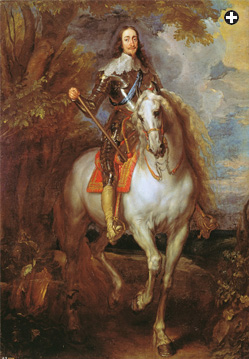
|
|
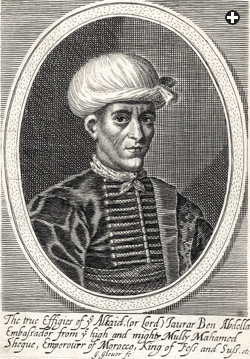
|
|
| |
scala / art resource |
|
national portrait gallery |
|
| |
In 1637, the pomp and ceremony of Jawdhar ibn 'Abd Allah's embassy to King Charles
i, left, prompted publication of a booklet describing
the events. This engraving of the young ambassador, right, appeared on its cover. |
|
Unfortunately, although Jawdhar was quite young, fits of ill health—perhaps malaria—
interrupted the program planned for him. Nevertheless, he entered London with great ceremony:
He and his escort traveled by barge from Greenwich to the Tower of London, "where they were
attended by thousands and tens of thousands of spectators." Riding in the king's own coach,
he was attended by "at least 100 coaches more, and the chiefest of the citizens and Barbary
merchants bravely mounted on horseback, all richly apparelled, every man having a chain of gold
about him: with the Sheriffs and Aldermen of London in their scarlet gownes with such abundance
of torches and links, that though it were night, yet the streetes were almost as light as day."
On November 5, after a fortnight's rest to recover his health, the ambassador rode out in
another great procession to meet the king. The order is described in detail in The arrivall
and intertainments..., including the liberated slaves and a gift of highly prized Barbary
horses, one of which was said to be worth more than $250,000 in today's money. All London
turned out to cheer, and it seems that the ambassador was delighted, although later
disappointed he was not well enough to attend the lord mayor's show, which he had his
attendants describe to him in detail.
The booklet describing these events, which included a short description of Morocco, was written
not as part of official diplomatic correspondence, but rather for a British public eager for
information. It is therefore interesting to read how warmly the author speaks of the ambassador:
This Alkaid Embassador hath an innated inclination to any thing that is noble, worthy and
befitting a gentleman; he is devoute and zealous in those wayes and rules of religion wherein
he hathe beene brought up.... Hee is courteous, bountifull, charitable, valiant, and a severe
punisher of enormities, as drunkenesse, or any prophanesse in his house; he speaks the Spanish,
Italian and Arabian tongues; and in a word, for humanity, morality and generosity, hee is a
most accomplish'd gentleman.
Some years before Jawdhar ibn 'Abd Allah's mission, the English had been dissuaded from
acknowledging the legitimacy of the breakaway state at Salé, and Charles i
had refused to ratify the agreement brought by its envoys. Moulay Muhammad's long letter
to Charles on this occasion was intended largely to promote trade cooperation and, as fellow
monarchs, to join forces to suppress rebellion and piracy. It was subsequently published as a
pamphlet for the general public:
Now because the islands which you Govern, have ever been famous for the unconquered strength
of their Shipping, I have sent this my trusty servant and Ambassador, to know whether in your
Princely wisdom, you shall think fit to assist me with such Forces by Sea as shall be answerable
to those I shall provide by Land.
While for a variety of reasons none of the many proposed Anglo-Moroccan attacks on Spain ever
came to much, the joint attempt to clear out the nests of pirates "that have so long molested
the peaceful Trade" was, at this particular moment, more successful.
| |
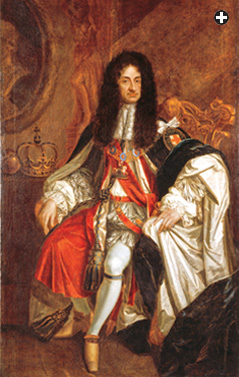
|
|
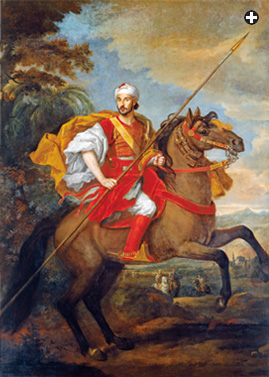
|
|
| |
national trust photo library / art resource |
|
chiswick house / english heritage photo library
/ bridgeman art library |
|
| |
Muhammad ibn Haddu, right, on his mission to King Charles ii,
left, made the most lasting impression of all the North African sultanates' diplomats.
Impeccable courtly manners, displays of horsemanship and an appreciation of English theater
made him "the fashion of the season." |
|
Years later, another embassy made great impact on the general public, the nobility and even the
academic world: that of Muhammad ibn Haddu, always referred to in the English sources as "Ben
Haddu." This was less because of his negotiations than because he seems to have had wide interests,
and he kept very much in the public eye. As John Evelyn puts it in his diary, "He was the fashion
of the season." Ben Haddu discussed the usual issues, peace and a trade treaty, though the document
was never ratified. (This in spite of the diarist Anthony Wood's entry for February 16, 1682,
which states that "an everlasting peace was concluded between our king and the emperour of Morocco
by his embassador in London.") This was largely because the English continued to occupy Tangier,
which gave them control over the Straits of Gibraltar, and because some English merchants
continued to trade illegally and not pay the required taxes.
Ben Haddu immediately won the approbation of the crowds by his splendid horsemanship (See "From
the Diary of John Evelyn," page 21) and of his peers by his exquisite manners. He seems to have
used his six months in England to experience as much of the country as possible. He visited the
Royal Society, which had been founded officially in 1660, and on May 31, 1682 he was given the
unusual distinction of being made an honorary fellow; his signature is to be seen in their register.
He may even have met one of its founding members, Sir Christopher Wren, when he went to look at
construction work on St. Paul's Cathedral, where he made a gift to the workmen of £15 (worth about
$3000 today). His sultan, Moulay Ismail, was passionately interested in architecture and was at
the time in the process of transforming his royal city, Meknès, so Ben Haddu probably passed on
a detailed account of the occasion.
His travels outside London took him primarily to Oxford and Cambridge and from there to Newmarket,
then as now a great center of horse racing and breeding. This would surely have been of particular
interest, since North African barbs were highly prized, and there, once again, a display of
horsemanship by himself and his companions was met with great admiration.
At Cambridge, the entertainment was more sober. There had been a chair of Arabic there since 1631,
funded by a merchant, Thomas Adams. The university granted Ben Haddu an academic distinction—perhaps
an honorary degree—but the banquet offered by the vice—chancellor was less successful.
Possibly because they were unsure of his dietary prohibitions, the meal was composed of fish, including
eels and sturgeon, and after it, the ambassador had to lie down at the provost's lodgings at King's
College until he recovered enough to depart.
There is a detailed account of his visit to Oxford in the diary of Anthony Wood, who recorded that
he stayed at the Angel Inn, the best hotel in the city, preferred by nobles and even royalty.
There, he would also have had the benefit of the two oldest coffee houses in England, established a
few years earlier. One of them, the Queen's Lane Coffee House, is still in existence today. But
judging by Wood's diary, Ben Haddu would have had little time for drinking coffee. First, a reception
by the notables of the university, at which the distinguished Arabist Edward Pocock said "something
in Arabick which made him laugh," and then on the following day what must have been a most exhausting tour:
In the morning about 8 or 9, he went to Queen's College and saw the Chap-el, hall, and had a horne
of beer but did not drinke. – Thence to the Physick Garden where Dr Morison harangued him.
– Then to Magdalene College where the president spake something to him; went into the chapel,
beheld the windows and paintings; thence round the cloister. – And so to New College where
he saw the chapel while the organ played. – Thence to St John's. – Then to Wadham [Wren's
college]. – Thence to All Souls; saw their chapel. Thence to University College. – And so
home to the Angell."
Again unwell after dinner—or perhaps simply exhausted—the ambassador arrived late at the
formal reception at the Sheldonian Theatre, where there were more speeches and music. Once again,
his presence caused a sensation. Wood relates:
'Tis thought that there was in the Theater 3000 people, and a thousand without that could not
get in; never more people in it since it was built [some 20 years earlier, by Wren] –
He went thence up to the public library, where he was entertained by an Arabick speech by Dr
Thomas Hyde [official interpreter to the court] which he understood.
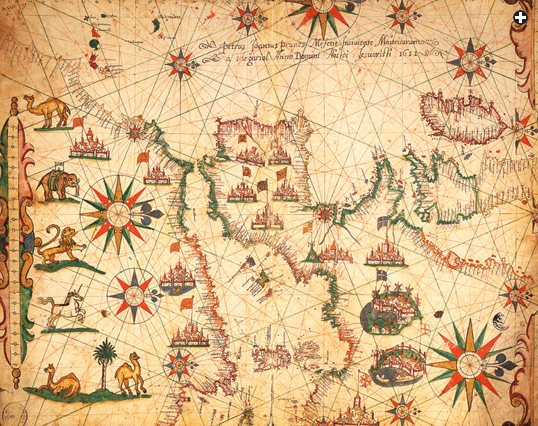 |
| museo correr /
bridgeman art library |
|
Dating from 1651, this section of a Venetian nautical map, oriented with west upward, shows
coastlines, harbors, ports and ruling powers. While North Africa, the Iberian Peninsula and
Europe received the cartographer's detailed and even creative attention, he drew no ruling
house at all in Great Britain.
|
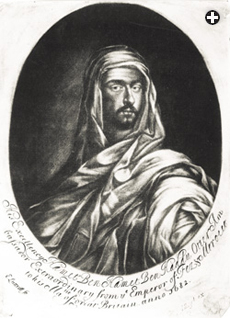 |
| bridgeman art library |
|
This mezzotint of "Ben Haddu," by Edward Lutrell, was published in 1682, the year of his embassy.
|
The day continued with more sightseeing and a banquet. At the end of this very long day, "the
vice-chancellor presented to him certaine books in Arabick."
We do not know which books he was given, but it is tempting to think that they included copies
of Pocock's own editions and translations of Arabic texts, such as his 1661 translation of
al-Tughra'i's famous Lamiyyat al-'Ajam (Qasida Rhyming in L) from the 12th century—
the first major work of Arabic poetry to be introduced to a western audience.
Interest in Morocco, the Arab world and Islam was undoubtedly stimulated by these direct
contacts, and Ben Haddu was in this sense an excellent cultural ambassador. Throughout the
17th century, Oxford in particular had been building up its collection of manuscripts, as
merchants returning from North Africa and the Levant were encouraged to bring back at least
one book. Medical students were supposed to have a basic knowledge of Arabic in order to
read the medical texts, although probably few of them did.
At the popular level, the interest was even more striking: Newspaper articles, pamphlets,
poems, histories and plays abounded. Many ambassadors, from various countries, were taken
regularly to the theater as part of their official entertainment, but they often returned
for their own pleasure, sometimes asking for a particular play. Ben Haddu saw "The Ingratitude
of the Commonwealth"—a version of "Coriolanus" "with dancing." A few days later, he was
"extreamly pleased" with "The Tempest," went to "The Bloody Brother" and "to his great
satisfaction" saw "Macbeth," among other productions. It is not clear whether or not he
saw "The Empress of Morocco," a great success and one of a number of plays on Moroccan and
Middle Eastern themes written to satisfy the popular interest. Later ambassadors showed equal
interest in the theater, although in 1724 ambassador 'Abd al-Qadir Perez seems to have
preferred more romantic and less political plays.
Trade with Morocco, and the visits of the Moroccan ambassadors, undoubtedly fed interest in
the Muslim world and encouraged reappraisal of the relationship between Christian and Muslim
spheres of influence. It is harder to know, however, what influence the experiences of the
ambassadors themselves may have had back home in Morocco, because so much less has survived
in the way of contemporary records—although material is still surfacing.
In terms of political negotiation, the embassies were less successful. It was unfortunate
that Charles ii ignored Ben Haddu's private advice (See
"Letter from Ben Haddu...," above) and, instead of selling or bartering Tangier, elected to
destroy and abandon it. This failure to pay due attention to Moroccan intelligence was to be
repeated in the early 18th century, as the frustrating experiences of the ambassador Ahmad
Qardanash make clear, and such carelessness worked to England's detriment. By and large, the
ambassadors' attempts to arrange treaties met with limited success due to reservations on
both sides, but as cultural ambassadors, their roles were invaluable, and the two countries
remained on largely amicable terms for several centuries.
 |
Caroline Stone (stonelunde@hotmail.com)
divides her time between Cambridge and Seville. Her latest book, Ibn Fadlan and the
Land of Darkness, translated with Paul Lunde from the medieval Arabic accounts of
the lands to the far north, was published in December by Penguin Classics. |